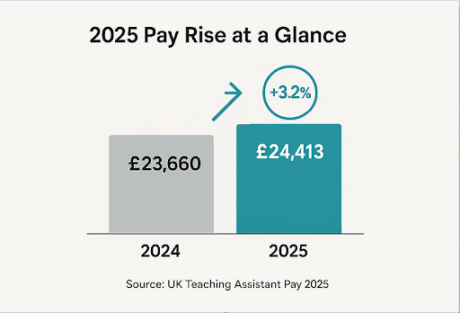No products in the cart.
Will teaching assistants get a pay rise in 2025? Yes, good news for TAs across the UK. Many have been waiting for this boost, especially with rising living costs.
In England, Wales, and Northern Ireland, pay goes up by 3.2% from 1 April 2025. This means the new starting salary (if you worked full-time, all year) will be £24,413. Most TAs work term-time only, so the take-home will still be pro-rated, but it’s a welcome boost.
In Scotland, things are a bit different. TAs there will see a 4% pay rise in 2025–26, and then another 3.5% rise in 2026–27. That gives a bit more certainty about the future.
So, whether you’re already a TA or thinking about becoming one, this pay rise shows the role is being valued more. It might not solve everything, but it’s a positive step in the right direction.

Teaching Assistant Pay Rise 2025: The Short Version
From 1 April 2025, most teaching assistants and school support staff in England, Northern Ireland, and Wales will get a pay rise. The new national pay deal increases the headline starting salary to £24,413 (full-time equivalent).
Many academies also follow this deal, but not all of them. That’s why it’s important to check your own contract or ask HR, so you know exactly how the rise affects you.
This rise is welcome news for TAs, who work so hard to support pupils every day. It means more recognition for your role and a bit more money in your pocket, too.
Will Teaching Assistants Get a Pay Rise?
The new full-time starter salary for teaching assistants is £24,413 from April 2025. That’s the headline figure everyone talks about.
But here’s the thing. Most TA jobs are term-time only. So your pay is pro-rated, which means your monthly pay will look lower than the headline number. Don’t panic — this is normal, because your salary is spread across the whole year.
Every council publishes updated pay tables each year. So, the best step is to check your local council’s website or HR team for your exact figure. That way, you’ll know what lands in your payslip.
Who Gets It — And When Will I See It?

The 2025 pay rise applies to support staff on council contracts in England, Wales, and Northern Ireland. Many academies also copy the same deal, but always check your own contract to be sure.
The new rate starts from April. However, if your school payroll takes longer to update, you should get back pay to cover the delay. That means you won’t lose out — it just lands later.
If you recently left a school job, you may still be owed the rise. In that case, ask HR or payroll how to claim it. It’s always worth checking.
Scotland Update: Different Deal, Same Good News
Council staff in Scotland have a separate pay deal. For 2025/26, the rise is +4%, and for 2026/27, it’s +3.5%. The increase is backdated to April 2025 once local agreements are signed off. That means staff won’t lose out, even if payroll takes time to catch up.
It’s not the same timetable as the rest of the UK, but the result is still a solid boost for school support staff.

The Jargon, Decoded
- Full-Time Equivalent (FTE): Pay for a full-year, full-time job. Schools scale it for term-time roles.
- Pay point (SCP): Your step on the pay ladder. Higher points bring higher pay.
- Allowances: Extra cash for a location, like London, or for duties like SEN and first aid.
- NJC / “Green Book”: The national rules most councils use for support-staff pay. HR keeps track of it, so you don’t have to.
London Weighting & Local Allowances
Some schools pay more if you work in or near London. This extra cash is called London Weighting. It helps cover the higher cost of living in the capital.
There are three main bands: Inner London, Outer London, and Fringe. Inner London gets the most. Fringe areas sit just outside the city and get a smaller top-up.
Local councils may also offer other allowances. These can link to duties, like first aid, or to special needs support.
In 2025, these allowances rise along with the main award. The exact increase depends on your council. So, always check with HR for the latest figures.
The Local Government Association (LGA) and NAHT publish updates every year. These sources make sure schools follow the agreed pay deals.
Payslip Checklist for April–July
- Check your new hourly or FTE figure. It should match the 2025 rate.
- Make sure your pay point (SCP) shows the right step.
- Look for updated allowances, including London or SEN.
- Back pay from 1 April should appear.
- Confirm your hours and weeks match your contract.
- The Local Government Association gives guidance on whether anything looks wrong.
2026 Heads-Up (One Line, Zero Stress)
From April 2026, the very lowest pay point on the support staff ladder will go. This change only affects staff at that point. Councils will move those staff to the next step on the scale.
This shift means no one stays on the bottom rung. Pay progression will start one step higher than before. It also ensures fairer entry pay for new staff.
UNISON and the Local Government Association (LGA) both confirm the change. They will release reminders closer to the date. Schools and HR teams will update contracts to match the deal.
Term-Time Pay Explained
Job adverts always show the big FTE figure. This is the full-time, full-year pay rate. Most teaching assistants do not work those hours.
Payroll adjusts that headline number. It scales your pay to the weeks you actually work, plus your holiday allowance. For most term-time staff, this means 38 or 39 weeks of work plus a few extra weeks added for holiday pay.
Next, payroll spreads the result evenly across twelve months. This makes your monthly pay steady, even though you only work during term-time.
That is why your payslip shows a lower monthly amount than the FTE headline. You still earn the full term-time salary. It is just stretched over the year so you get paid every month, including holidays.
How to Boost Your Take-Home (Friendly Wins)
- More hours, more weeks: Ask if you can add extra hours or weeks to your contract. Even small changes make a real difference.
- Step up the ladder: Moving to HLTA or a senior TA role gives you better pay and fresh challenges.
- Look for add-ons: Schools often pay extra for SEN work, first-aid cover, or running after-school clubs. These extras top up your pay.
Benefits That Add Real Value (Beyond Salary)
The Local Government Pension (LGPS) is a big win. Employers cover most of the cost of your future pension. You pay a smaller rate based on your earnings. This means strong long-term value for every pound you put in.
You also get leave and wellbeing offers through your council or trust. These include holiday, family support, and staff wellbeing schemes. If you work term-time, your allowance is pro-rated.
The Local Government Association and your HR team share details each year. Hackney Recruitment also highlights these benefits when advertising TA roles.
Where to Check Your Exact New Rate (Today)
Start with your council’s 2025 pay spine page or HR portal. These pages show the updated points and hourly figures.
You can also look at the locally published tables. For example, NICVA or council PDFs confirm the £24,413 starter figure. Stockton-on-Tees Borough Council and NICVA both post updates online. These sources make it easy to confirm your new rate today.
Your pay rise is just the start.
Checking your new rate is step one. Step two is learning how to boost your income and career with smart moves. Our course gives Teaching Assistants the insider know-how to grow pay, spot extras, and plan ahead with ease.
FAQs on TA Pay Rises
Q1. Will teaching assistants get a pay rise in 2025?
Yes. The 2025 pay award lifts all points on the pay scale. Your exact rise depends on your pay point and council.
Q2. How do I know my new hourly rate?
Check your council’s pay spine table or HR portal. This list updates points and hourly figures.
Q3. Do London TAs get more pay?
Yes. London Weighting adds extra pay for Inner, Outer, and Fringe London. The amount depends on the location.
Q4. When will back pay arrive?
Back pay usually covers from 1 April. It should show in payslips between April and July.
Q5. Can I boost my income as a TA?
Yes. You can add hours, take on SEN or first-aid duties, or step up to HLTA roles.







